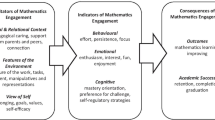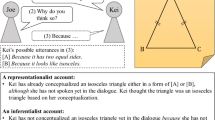Abstract
Based on an enactivist perspective on learning mathematics, we articulate three key processes of designing mathematics-grounding activities (MGAs) where students’ mathematical thinking can be motivated and shaped with the interactions between their enactments and the evolving tasks in the activities. Then, evaluation criteria and design steps will be derived in terms of the key processes. The key processes of designing MGAs, the criteria for evaluating quality MGAs and the design steps also emerged from the reciprocal relationships between theories and practices in the context of the Just Do Math (JDM) program. The processes and steps of designing MGAs suggested in this article can benefit researchers and educators to develop original activities for advancing the learning of mathematics in line with the enactivist perspective. Additionally, the key processes can be further referred to for explanations of how metaphorical grounds of mathematics can emerge under systemic interactions between learners, tasks and social contexts, and how learners’ motivation is integrated into the evolving tasks. Criteria could be applied for not only evaluating the potential of MGAs but also for identifying the weaknesses needed to be modified.


Similar content being viewed by others
References
Abrahamson, D., & Lindgren, R. (2014). Embodiment and embodied design. In R. K. Sawyer (Ed.), The Cambridge handbook of the learning sciences (2nd ed.). Cambridge University Press.
Ausubel, D. P. (1961). In defence of verbal learning. Educational Theory, 11(1), 15–25.
Bruner, J. S. (1964). The course of cognitive growth. American Psychologist, 19(1), 1–15.
Caglayan, G. (2013). Prospective mathematics teachers’ sense making of polynomial multiplication and factorization modeled with algebra tiles. Journal of Mathematics Teacher Education, 16(5), 349–378.
Cheng, Y.H. (2000). Student teachers’ learning process of pedagogical concept: The case of generic example for learning mathematics concept (Unpublished doctoral dissertation). National Taiwan Normal University, Taiwan
Coles, A., & Brown, L. (2016). Task design for ways of working: Making distinctions in teaching and learning mathematics. Journal of Mathematics Teacher Education, 19(2–3), 149–168.
Csikszentmihalyi, M. (1991). Design and order in everyday life. Design Issues, 8(1), 26–34.
Csikszentmihalyi, M. (2002). Flow: The classic work on how to achieve happiness. Rider.
Davis, B. (1995). Why teach mathematics? Mathematics education and enactivist theory. For the Learning of Mathematics, 15(2), 2–9.
Deng, C.-J. (2014). Squaring the Squares and Rectangles. Retrieved Oct. 14, 2020, from https://reurl.cc/E2QNA1
Dienes, Z. (1973). The six stages in the process of learning mathematics. Windsor Berks, U.K.: NFER Publishing.
Fenwick, T. (2000). Expanding conceptions of experiential learning: A review of the five contemporary perspectives on cognition. Adult Education Quarterly, 50(4), 243–273.
Freudenthal, H. (1991). Revisiting mathematics education: China lectures. Kluwer Academic Publishers.
Harell, G., & Tall, D. (1991). The General, the abstract, and the generic in advanced mathematics. For the Learning of Mathematics, 11(1), 38–42.
Hutto, D. D., Kirchhoff, M. D., & Abrahamson, D. (2015). The enactive roots of STEM: Rethinking educational design in mathematics. In P. Chandler & A. Tricot (Eds.), Human movement, physical and mental health, and learning [Special issue]. Educational Psychology Review, 27(3), 371–389.
Kieren, T., Gordon-Calvert, L., Reid, D., & Simmt, E. (1995). An enactivist research approach to mathematical activity: Understanding, reasoning and beliefs. Paper presented at the meeting of the American Educational Research Association, San Francisco, CA
Kiili, K., de Freitas, S., Arnab, S., & Lainema, T. (2012). The design principles for flow experience in educational games. Procedia Computer Science, 15, 78–91.
Kiili, K., Lainema, T., de Freitas, S., & Arnab, S. (2014). Flow framework for analyzing the quality of educational games. Entertainment Computing, 5(4), 367–377.
Lakoff, G. (2009). The neural theory of metaphor. SSRN Electronic Journal. https://doi.org/10.2139/ssrn.1437794
Lakoff, G., & Núnez, R. E. (2013). The metaphorical structure of mathematics: Sketching out cognitive foundations for a mind-based mathematics. In L. English (Ed.), Mathematical reasoning: Analogies, metaphors and images (pp. 29–98). Routledge.
Leitze, A. R., & Kitt, N. A. (2000). Using homemade algebra tiles to develop algebra and prealgebra concepts. The Mathematics Teacher, 93(6), 462.
Lin, F. L., & Chang, Y. P. (2019). Research and development of mathematics-grounding activity modules as a part of curriculum in Taiwan. In School mathematics curricula (pp. 151–168). Singapore: Springer.
Lin, F. L., Wang, T. Y., & Yang, K. L. (2018). Description and evaluation of a large-scale project to facilitate student engagement in learning mathematics. Studies in Educational Evaluation, 58, 178–186.
Lozano, M. D. (2017). Investigating task design, classroom culture and mathematics learning: An enactivist approach. ZDM Mathematics Education, 49(6), 895–907.
Mason, J., & Johnston-Wilder, S. (2004). Fundamental constructs in mathematics education. Routledge Falmer.
Mason, J., & Pimm, D. (1984). Generic examples: Seeing the general in the particular. Educational Studies in Mathematics, 15(3), 277–289.
Maturana, H. R., & Varela, F. J. (1992). The tree of knowledge: The biological roots of human understanding (Revised). Shambhala.
Menary, R. (2008). Embodied narratives. Journal of Consciousness Studies, 15(6), 63–84.
Mullis, I. V., Martin, M. O., Foy, P., & Arora, A. (2012). TIMSS 2011 international results in mathematics. Amsterdam: International Association for the Evaluation of Educational Achievement (IEA).
Núñez, R. (2000). Mathematical idea analysis: What embodied cognitive science can say about the human nature of mathematics. In T. Nakahara & M. Koyama (Eds.), Proceedings of the 24th Conference of the International Group for the Psychology of Mathematics Education (pp. 3–22). Japan: Hiroshima University.
OECD. (2014). PISA 2012 technical report. Paris: PISA, OECD Publishing.
Proulx, J. (2013). Mental mathematics, emergence of strategies, and the enactivist theory of cognition. Educational Studies in Mathematics, 84(3), 309–328.
Radford, L. (2000). Signs and meanings in students' emergent algebraic thinking: A semiotic analysis. Educational studies in mathematics, 42(3), 237–268.
Shargel, D., & Prinz, J. J. (2018). An enactivist theory of emotional content. The ontology of emotion (pp. 151–168). Cambridge University Press.
Simmt, E., & Kieren, T. (2015). Three “moves” in enactivist research: A reflection. ZDM, 47(2), 307–317.
Skemp, R. R. (1989). Mathematics in the primary school. Routledge.
Thompson, E. (2007). Mind in life: Biology, Phenomenology, and the Sciences of Mind. Harvard University Press.
Threlfall, J. (2002). Flexible mental calculations. Educational Studies in Mathematics, 50(1), 29–47.
Uttal, D. H., Scudder, K. V., & DeLoache, J. S. (1997). Manipulatives as symbols: A new perspective on the use of concrete objects to teach mathematics. Journal of applied developmental psychology, 18(1), 37–54.
Varela, F. (1999). Ethical know-how: Action, wisdom, and cognition. Stanford University Press.
Varela, F., Thompson, E., & Rosch, E. (1991). The embodied mind: Cognitive science and human experience. MIT Press.
Von Glasersfeld, E. (1990). An exposition of constructivism: Why some like it radical. In R. B. Davis, C. A. Maher, & N. Noddings (Eds.), Constructivist views on the teaching and learning of mathematics (JRME Monograph 4) (pp. 19–29). NCTM.
Wang, T. Y., Lin, F. L., & Yang, K. L. (2021). Success factors for a national problem-driven program aimed at enhancing affective performance in mathematics learning. ZDM–Mathematics Education, 1–16.
Watson, A., & Mason, J. (2007). Taken-as-shared: A review of common assumptions about mathematical tasks in teacher education. Journal of Mathematics Teacher Education, 10(4), 205–215.
Funding
This paper is part of a research project funded by the Ministry of Science and Technology of Taiwan (MOST 106 - 2511 - S - 003 - 003).
Author information
Authors and Affiliations
Corresponding author
Ethics declarations
Conflict of interest
Not applicable.
Additional information
Publisher's Note
Springer Nature remains neutral with regard to jurisdictional claims in published maps and institutional affiliations.
Rights and permissions
About this article
Cite this article
Yang, KL., Lin, FL. & Tso, TY. An Approach to Enactivist Perspective on Learning: Mathematics-Grounding Activities. Asia-Pacific Edu Res 31, 657–666 (2022). https://doi.org/10.1007/s40299-021-00616-3
Accepted:
Published:
Issue Date:
DOI: https://doi.org/10.1007/s40299-021-00616-3




